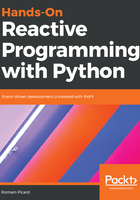
The from_ operator
The from_ operator is the operator that was used in the previous example to create an observable from a list. The marble diagram of this operator is shown in the following figure:

The prototype of this operator is the following one:
Observable.from_(iterable, scheduler=None)
The first parameter accepts any iterable object. This includes lists, tuples, dictionaries, and any class that implements the iterator methods __iter__ and next. The second parameter is used to provide a scheduler that will be used to emit the items of the observable. This parameter is present on all creation operators. It is useful when running in an asynchronous environment or an environment with concurrency. We will study schedulers in detail in Chapter 5, Concurrency and Paralellism in RxPY.
The from_ operator creates an observable that emits one item per entry in the iterable. It then completes the observable. Here are some examples of usage which show the items that they return:
Observable.from_(sys.argv) # argv[0], argv[1], argv[2]..., completed
Observable.from_([1, 2, 3, 4]) # 1, 2, 3, 4, completed
Observable.from_({'foo': 'fooz', 'bar': 'barz'}) # 'foo', 'bar', completed
Note that when using a dictionary, the observable contains the keys of the dictionary and not the values. This is the same behavior as a classic Python iteration on a dictionary using a for loop.